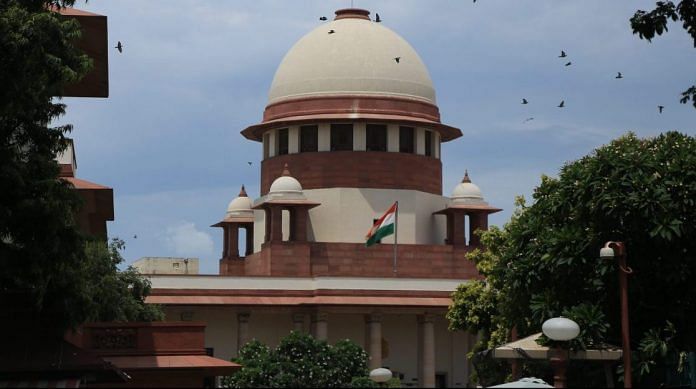The Narendra Modi government, just like its predecessors, is not going to do much.
As it approaches the end of its five-year tenure, the Narendra Modi government has yet again started talking about the need to have an All India Judicial Service (AIJS)—the idea has been around since the ’50s—as well as reservation for scheduled castes (SCs) and scheduled tribes (STs) in the judiciary.
The purpose is clear: lure SCs and STs with the lollipop called reservations. So what if such a thing isn’t legally tenable, unless the Parliament amends the Constitution?
And, with less than three months left before the Model Code of Conduct kicks in for the next general elections, amending the Constitution will be almost impossible. But, the government may have already achieved the result: spread the good news, hinting that reservation in the higher judiciary is on its way and leave the rest to the party faithful.
Though much required, the AIJS is a stillborn concept, with the idea itself facing strong opposition from the higher judiciary—in spite of the fact that the Parliament amended Article 312 in 1976 to incorporate a provision for establishment of the AIJS.
Article 312 (1) says that Parliament can pass an Act to provide for the creation of AIJS while Article 312 (3) says the AIJS can’t include a post inferior to the rank of district judge.
Yet, four decades after the Parliament passed the amendment, the AIJS remains just an idea.
In India, we have a double-tier judicial system: a subordinate judiciary headed by district and sessions judges, who mainly come from the state judicial service whose control vests with the high courts and the state governments.
The appointment of subordinate judges is made by the governor through consultation with the respective state’s high court and the state public service commission.
Also read: Niti Aayog proposes pan-India exam to select judges for lower judiciary
Opposition to AIJS
The Law Commission of India in at least three reports—14th (1958), 77th (1978) and 116th (1986)—recommended the creation of the AIJS.
Even the Supreme Court, in its judgment in the All India Judges Association versus Union of India case, recommended that the feasibility of establishing the AIJS be examined.
However, the opposition to the plan has come mainly from within the judiciary with several high courts and some state governments opposing it on the grounds that inadequate knowledge of regional languages could make the judges’ job extremely difficult.
The high courts, in my opinion, opposed the move on the specious grounds that it would erode their control over the subordinate judiciary.
The UPA government prepared a comprehensive roadmap for the constitution of AIJS and the same was cleared by a committee of secretaries in November 2012.
But when the issue was taken up for discussion at the 2013 Conference of Chief Ministers and Chief Justices, there was no unanimity.
High courts like Madras, Andhra Pradesh, Bombay, Delhi, Punjab and Haryana, Gujarat, Karnataka, Madhya Pradesh and Patna opposed it.
Consensus eluded the issue at the 2015 Conference of Chief Ministers and Chief Justices too.
This has allowed successive governments to keep the issue in cold storage.
Also read: A wish list, your honour: How the Indian judiciary can get back its prestige in 2019
Need for representation
Under the Constitution, there is a bar on reserving posts of judges of the Supreme Court and the high courts for SC, STs, OBCs and minorities.
Currently, there isn’t a single SC or ST judge in the Supreme Court.
In 2000, the Parliamentary Committee on the Welfare of Scheduled Castes and Scheduled Tribes headed by BJP leader Karia Munda, in a report, suggested to the government that it take steps to amend Articles 217 and 124 of the Constitution to give adequate representation to the deprived sections in the higher judiciary.
“Judges take oath that they (will) uphold the Constitution and the laws. But the Supreme Court and a few high courts by claiming power over the Constitution practise untouchability and are disobeying the Constitution with regard to Article 16(4) and Article 16(4A),” the report said.
However, nothing has been done to change the status quo and as things stand, barring loud statements, the Narendra Modi government, too, is not going to do much.




The AIJS is an idea worth studying further. Not reservations, in either the judiciary or the armed forces. As a general principle, a government should not take momentous decisions so close to the end of its tenure. Electoral considerations can outweigh a concern for the national interest.